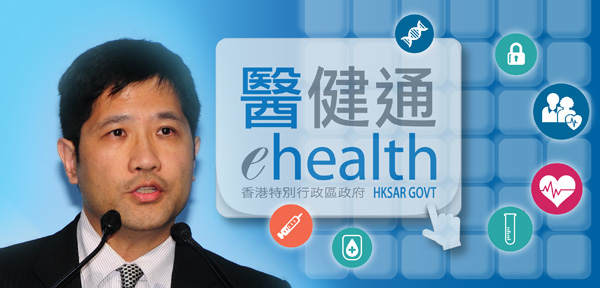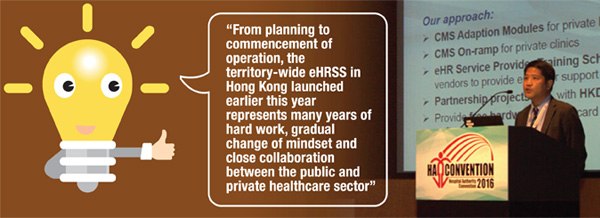 |
|
“The development of the electronic health record (eHR) in Hong Kong is a two-decade journey, leading us into an unprecedented realm of healthcare collaboration.” Mr Sidney Chan, Commissioner for the Electronic Health Record, shared his reflections of the Government-led, territory-wide Electronic Health Record Sharing System (eHRSS) project and his vision for eHR's further development in Hong Kong. |
Mr Sidney Chan
Commissioner for the Electronic Health Record |
|
| |
 |
| |
“From planning to commencement of operation, the territory-wide eHRSS in Hong Kong launched earlier this year represents many years of hard work, gradual change of mindset and close collaboration between the public and private healthcare sector,” said Mr Chan.
The response from the healthcare sector and the community to the eHRSS has been encouraging since the system commenced operation on 13 March 2016. |
|
 |
|
eHealth development in Hong Kong is a two-decade journey involving efforts and collaboration of various parties |
|
| |
|
“As at end-July 2016, over 200,000 members of the public have participated in the eHRSS. As for healthcare providers (HCPs), the Hospital Authority (HA), the Department of Health (DH) and all 11 private hospitals have joined the system. Meanwhile, registration for over 800 private HCPs has been completed. More than 34,000 healthcare professionals (HCProfs) working in the public and private sector could now utilise the eHRSS and access the records on a need-to-know basis. |
| |
| Development Path of eHealth Record Sharing in Hong Kong |
| |
|
Earlier at the HA Convention on 3 May 2016, Mr Chan made a presentation on the development path of eHR sharing in Hong Kong. |
| |
|
He shared with the audience that the Government has adopted a phased and pragmatic approach in eHR sharing, and the history dated back to about two decades ago: |
| |
 |
|
Clinical Management System (CMS) of the HA: eHR sharing among public hospitals since 2000 |
|
 |
 |
|
PPI-ePR: one-way eHR sharing from the HA to private HCPs to test the concept, operational workflow and relevant technologies of eHR sharing |
|
 |
 |
|
Proposal put forward by the Government to develop a territory-wide eHRSS |
|
 |
 |
|
eHRSS: two-way eHR sharing among public and private HCPs |
|
| |
|
When asked to elaborate on the transition from one-way sharing under Public-Private Interface - Electronic Patient Record Sharing Pilot Project (PPI-ePR) to two-way sharing under eHRSS, Mr Chan explained, “As its title reflects, the PPI-ePR is a pilot project. It is a one-way sharing arrangement that would enable private doctors to view HA records but not the other way round. In contrast, the eHRSS enables two-way sharing of participating patients’ useful health data between public and private HCPs. The more comprehensive patient records shared under eHRSS would be contributed not just by HA but also by participating private HCPs. The two-way sharing under eHRSS would certainly bring greater benefits to patients.” |
| |
|
Benefits of two-way sharing under eHRSS: |
| |
|
|
Providing building blocks of patients’ life-long health records conducive to continuity of care; and |
|
|
Enabling private and public sector doctors to obtain more comprehensive records about the patient, thereby - |
| |
|
|
reducing the risks of medication errors; |
|
|
enabling alert on possible drug allergies; and |
|
|
saving time and efforts on unnecessary, duplicating tests. |
|
|
| |
|
The eHRSS Challenges |
| |
|
The eHRSS project comprises two stages of development work, with the first stage completed in early 2016. Looking back, Mr Chan said the Stage One project team had to overcome many challenges. He particularly named four major ones. |
| |
 |
| The Stage One eHR Programme has overcome four major challenges |
| |
|
| Clinical Usability |
| |
|
To begin with, clinical usability was the foremost challenge that had to be addressed. “As the eHRSS is a very special information technology (IT) system, its development and operation require heavy input of clinical expertise not readily possessed by IT vendors in the private sector in Hong Kong. Our decision was to engage the HA as the technical agency to develop and operate the eHRSS,” Mr Chan explained. |
| |
| System Security and Patient Privacy |
| |
|
The second challenge was concern about system security and patient privacy. Mr Chan said. “This is to
ensure system security and patient privacy in order to instill public confidence in the eHRSS, a key factor
in encouraging voluntary participation in the sharing of sensitive personal data.” |
| |
|
“In so far as legal protection is concerned, we prepared the eHRSS Ordinance, a new legislation to cover key aspects of the eHRSS. We also considered it important for data access to be carried out on the “need-to-know” and “patient-under-care” basis. Code of Practice and guidelines on how to properly use the system were provided by the eHR Office,” he added. |
| |
|
“At the same time, various security and privacy measures were built into system design and operational workflow," said Mr Chan. |
| |
|
“We have worked out a participant information notice to ensure patients’ consents are express and informed. We have also set up a back-up data centre, conducted cyber security drills, formulated a business continuity plan and established an IT Security Working Group to prepare for potential security incidents,” he added. |
| |
| Technical Readiness of HCPs and Data Standardisation |
| |
|
The third challenge, Mr Chan pointed out, concerned the technical readiness of private HCPs. “As health
data is kept by different providers individually and in different forms, it is often not standardised for
accurate interpretation by fellow providers and storage in the eHRSS,” he said. |
| |
|
"To assist the private HCPs, the CMS Adaptation Modules and the CMS On-ramp were developed for private hospitals’ flexible incorporation into their eHR systems and for use by private clinics respectively. An eHR Service Provider Training Scheme was also worked out for IT vendors who provide end-user support services to HCPs adopting the CMS On-ramp." |
| |
|
Mr Chan added, “We have facilitated eHR systems in the market to connect to the eHRSS, for example, by providing technical specifications. We also rolled out a number of partnership projects, made available hardware and software on giving patient’s sharing consent, as well as user support and assistance to private HCPs.” |
| |
|
“As for data standardisation, the Hong Kong Clinical Terminology Table has been developed, which is available for use by HCPs’ participating in the eHRSS via licensing agreements,” Mr Chan said. |
| |
| Promotion and Recruitment
|
| |
|
The final challenge was to recruit participants to join the eHRSS. “After all, participation in the new
scheme is voluntary in nature. We need to ensure that the system is user-friendly, well received by the
community, as well as easy to join,” said Mr Chan. |
| |
|
Special transitional arrangements were made for existing PPI-ePR participants to pre-register for the eHRSS since December 2015, while open registration for fresh participants commenced in March 2016. |
| |
|
“We launched various publicity measures to promote the system and its benefits to the community. We also put in place multiple means for registration. Mobile registration teams are deployed to public hospitals and clinics, as well as elderly homes to facilitate patient registration,” said Mr Chan. |
| |
|
“As for HCPs, the application procedures have been reviewed and streamlined with a view to making it more convenient for them to join. For example, the registration form has been simplified and is available on the eHRSS website. Upon submission of the required supporting documents, application vetting normally takes only a few working days. Our target is to schedule technical set up with the applicant within two weeks. Additional manpower has been deployed to handle the applications and set up,” Mr Chan added. |
| |
|
On training and support to HCPs, in particular for private clinics, Mr Chan said training materials introducing the functions and operation of eHRSS are provided. Such materials are available online in video format for easy reference. Further training sessions will be considered if needed. |
| |
|
https://m.youtube.com/user/ehrssgovhk |
| |
|
“I often remind myself that eHRSS is a new system. Both patients and healthcare professionals need time to understand the concept and the potential benefits,” he said. |
| |
|
“All in all, the importance of stakeholder engagement across all stages of the eHR Programme cannot be understated,” he stressed. |
| |
|
“The result so far has been better than I expected. To put things in context, comparison could perhaps be made to the PPI-ePR, which was a prelude to the eHRSS. For the PPI-ePR, it took more than five years to recruit 200,000 patients and 2,300 private sector HCProfs. The eHRSS has achieved the same numbers in only four months,” Mr Chan remarked. |
| |
|
In concluding the work of Stage One, Mr Chan said, “The past few years have been exciting but also demanding for colleagues involved in developing the eHRSS. With the support of the public and private healthcare sector as well as patients, we are delighted to see the system successfully launched.” |
| |
|
Stage One eHR Programme |
| |
|
|
Capital funding: approval of $702 million by the Legislative Council (LegCo) in 2009 |
|
|
Targets: |
| |
|
|
Set up a sharing platform for connecting all participating HCPs. |
|
|
Make available in the market eHR systems for private HCPs to use and connect to the platform. |
|
|
Prepare a dedicated legislation for protecting data privacy and system security. |
|
|
|
Launched on 13 Mar 2016 |
|
| |
| Stage Two eHR Programme |
| |
|
As to the way forward, Mr Chan is confident that Hong Kong is ready to proceed further in eHR development. |
| |
 “We are finalising the scope of the Stage Two system development of the eHRSS,” Mr Chan said, “The Stage Two programme aims to further enhance eHRSS’s functionalities in better supporting healthcare. The tentative scope includes the sharing of radiological images and Chinese medicine information, enhancement of patients’ choice over data sharing, development of a patient portal to facilitate patient access to health data and enhancement of security and privacy protection.” “We are finalising the scope of the Stage Two system development of the eHRSS,” Mr Chan said, “The Stage Two programme aims to further enhance eHRSS’s functionalities in better supporting healthcare. The tentative scope includes the sharing of radiological images and Chinese medicine information, enhancement of patients’ choice over data sharing, development of a patient portal to facilitate patient access to health data and enhancement of security and privacy protection.” |
| |
|
The Government’s plan is to seek approval of $422 million capital funding from the LegCo’s Finance Committee in 2016/17. |
| |
|
“We anticipate that implementing the Stage Two programme will not be an easy task. That said, by working hand in hand with stakeholders and experts, we will move forward,” Mr Chan remarked. |
| |
|
|




 “We are finalising the scope of the Stage Two system development of the eHRSS,” Mr Chan said, “The Stage Two programme aims to further enhance eHRSS’s functionalities in better supporting healthcare. The tentative scope includes the sharing of radiological images and Chinese medicine information, enhancement of patients’ choice over data sharing, development of a patient portal to facilitate patient access to health data and enhancement of security and privacy protection.”
“We are finalising the scope of the Stage Two system development of the eHRSS,” Mr Chan said, “The Stage Two programme aims to further enhance eHRSS’s functionalities in better supporting healthcare. The tentative scope includes the sharing of radiological images and Chinese medicine information, enhancement of patients’ choice over data sharing, development of a patient portal to facilitate patient access to health data and enhancement of security and privacy protection.”
